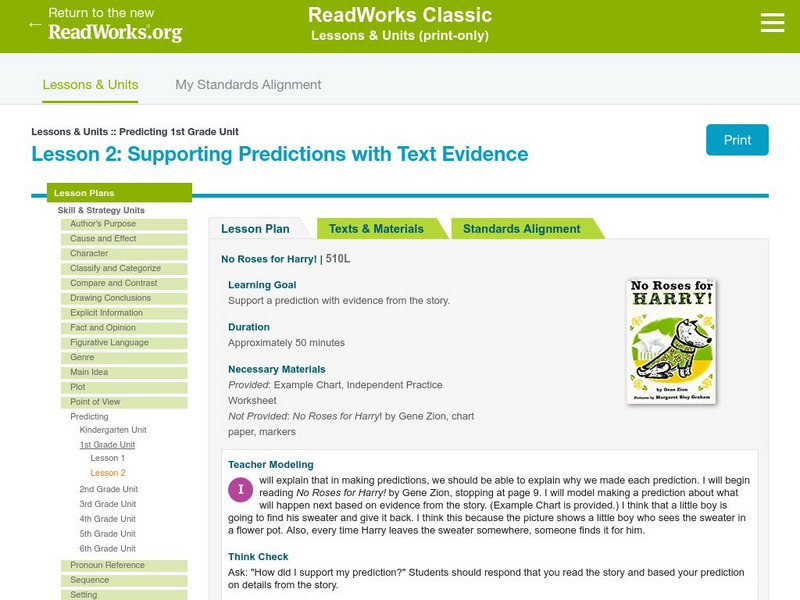Curated OER
Tuck Everlasting
Seventh graders use literary terms while discussing literature with their peers. They explore literature on a deeper level. Students formulate their opinions regarding response to literature, as this lesson helps students practice...
Curated OER
Sentence Completion: High-Intermediate Level
Learners can practice their reading strategies and comprehension skills with a sentence completion worksheet that comes with a detailed answer key. Whether you use the worksheet as an assessment or as a group or individual practice...
Curated OER
Using Poetry in Teaching Reading to Special Education Students
A series of well-written activities, these lessons prompt middle schoolers reading below grade level (at a second, third, or fourth grade level) to use poetry to practice basic reading skills. They rhyme, build words, make inferences,...
Curated OER
A Fantasy Story: Baby Bear's Space Journey
Give this literacy worksheet to your beginning readers to help them draw out key details and retell in their own words. They read a short fantasy story about a bear in space which includes dialogue, onomatopoeia, and a simple story line....
Curated OER
Examining Character Traits through Character Mapping
Some of what we know about a character is directly stated. Some of what we know is inferred by events in the story. Character maps help primary learners recognize the difference. After modeling with a story your class has read, pupils...
Curated OER
Comprehension Questions: The City of Ember, Chapter 20
Comprehension questions for the last chapter of Jeanne DuPrau's book The City of Ember assess factual recall, sequencing skills, and inference about the text. Note: One question about point of view is based on a sentence not related to...
Curated OER
Scientific Thinking
Students participate in four different activities which reinforce an understanding of they way scientists think about the world. They make careful observations of two different pennies, write the procedure for making a peanut butter and...
Science Education Resource Center at Carleton College
Serc: Investigating South Crow River: Discharge, Turbidity, Erosion, Sediments
In this field investigation, small groups of students will observe and measure characteristics of the South Crow River near Mayer, Minnesota. Data collection on these characteristics will include but not be limited to: speed of current...
Texas Education Agency
Texas Gateway: Themes in Literary Texts (English 6 Reading)
Learn how to infer the implicit theme in a work of fiction, distinguish theme from topic, and make complex inferences using textual evidence.
Texas Education Agency
Texas Gateway: Understand New Vocabulary Within Context (English 6 Reading)
You will learn how to use context (e.g., cause and effect or compare and contrast organizational text structures) to determine or clarify the meaning of unfamiliar or multiple-meaning words.
Polk Brothers Foundation Center for Urban Education at DePaul University
De Paul University: Center for Urban Education: City Mouse a Fable [Pdf]
"City Mouse: A Fable" is a one- page fable about a city mouse and a country mouse. The city mouse visits the country mouse where food is limited. The country mouse visits the city where the food is great, but there is constant danger. It...
E Reading Worksheets
E Reading Worksheets: Implicit Character Traits Worksheet
In this learning module, students will practice making inferences about character traits. A worksheet is provided to practice with finding implicit character traits. This module is designed to support Tier I, Tier II, and Tier III students.
E Reading Worksheets
E Reading Worksheets: Characterization Group Project
In this learning module, students will learn more about characterization. Worksheets are provided to reinforce the understanding of character traits. This module is designed to support Tier I, Tier II, and Tier III students.
Other
Pennsylvania Doe: Lesson Plan: Making Inferences and Drawing Conclusions
In this lesson the teacher uses modeling and questioning strategies to walk students through making inferences in various texts and then using those inferences to draw conclusions.
Read Works
Read Works: 1st Grade Unit: Supporting Predictions
[Free Registration/Login Required] A lesson plan utilizing the book No Roses for Harry! by Gene Zionin in which students make a prediction and then support it with details from the text. Ideas for direct teaching, guided practice, and...
Read Works
Read Works: Grade 1: Three Lesson Unit: Character: Actions, Feelings, Looks
[Free Registration/Login Required] A series of three lesson plans, based on David Shannon's books No, David!, David Gets in Trouble, and David Goes to School. Students learn how to utilize text and picture clues to determine and describe...
Louisiana Department of Education
Louisiana Doe: Louisiana Believes: Eureka Math Parent Guide: Statistics and Probability
A guide to support parents as they work with their students in statistics and probability.
McGraw Hill
Read: Does Technology Make Us Lazy?
Compare these two passages for some interesting ideas about how technology affects our lives. The questions that follow ask you to identify the main idea from either direct statement or inference.












![De Paul University: Center for Urban Education: City Mouse a Fable [Pdf] Activity De Paul University: Center for Urban Education: City Mouse a Fable [Pdf] Activity](https://static.lp.lexp.cloud/images/attachment_defaults/resource/large/FPO-knovation.png)



